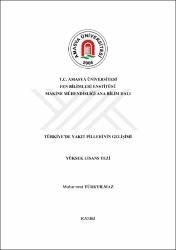| dc.contributor.advisor | Kaplan, Mahmut | |
| dc.contributor.author | Türkyılmaz, Muhammet | |
| dc.date.accessioned | 2022-03-09T14:56:19Z | |
| dc.date.available | 2022-03-09T14:56:19Z | |
| dc.date.issued | 2021 | |
| dc.identifier.uri | https://tez.yok.gov.tr/UlusalTezMerkezi/TezGoster?key=RjZwH00oMG4iNa5SgvlggyoXLegpwvVqj8eHOlrJu_bE1dus7pT_icLYjlPI6lqP | |
| dc.identifier.uri | https://hdl.handle.net/20.500.12450/1922 | |
| dc.description.abstract | Son zamanlarda küresel ısınma ve iklim değişikliği dünyanın önemli bir sorunu haline gelmiş ve insanlık atmosferi kirletip sera gazı etkisi oluşturan fosil yakıtlara alternatif oluşturacak enerji kaynağı arayışı içine girmiştir. Bu kapsamda dünya çapında yapılan çalışmalar evrendeki en fazla bulunan element olan hidrojenin oksijen ile elektrokimyasal reaksiyona girmesi sonucunda çevre dostu elektrik enerjisi üreten cihazlar olan yakıt pilleri üzerinde yoğunlaşmıştır. Yakıt pillerinin üretimi ve geliştirilmesi, ülkemizin ileri enerji teknolojiler alanında söz sahibi olabilmesi, enerji kaynaklarının çevreye olumsuz etkilerinin azaltılarak yaşam kalitesinin artırılması ve artan enerji talebinin yerel enerji kaynakları ile karşılanarak dışa bağımlılığın azaltılması açılarından önemlidir. Bu çalışmada, YÖK Ulusal Tez Merkezi veri tabanı taranarak 2000-2021 yılları arasında elde edilen yakıt pilleriyle ilgili 265 adet onaylanmış tez analiz edilmiştir. Dünyadaki genel eğilime paralel olarak, incelenen tezlerin çoğu polimer elektrolit membran yakıt pili (PEMYP) ile ilgilidir ve ikinci sırada katı oksit yakıt pili (KOYP) ile ilgili çalışmalar yer almaktadır. Bu çalışmaları sırasıyla doğrudan alkol yakıt pili ve ülkemizde yakıtı olan borun hammaddesinin bol miktarda bulunduğu doğrudan borhidrür yakıt pili ile ilgili tez çalışmaları takip etmektedir. PEMYP ilgili çalışmalarda membran, gaz difüzyon ve katalizör tabakaları ve su yönetiminin iyileştirilmesi için farklı malzemeler kullanılmıştır. Diğer yandan, KOYP ilgili çalışmalarda interkonnektör, anot, katot ve elektrolit bileşenleri için çeşitli malzemeler kullanılmıştır. Bu malzemelerin PEMYP ve KOYP performansına etkisi detaylı olarak analiz edilmiştir. Niğde Ömer Halisdemir Üniversitesi Araştırma Merkezi ve Tübitak MAM Enerji Enstitüsü'nde üniversite-sanayi iş birliğiyle yapılan projeler Türkiye'de yakıt pili teknolojilerinin gelişmesi için önemli bir alt yapı oluşturmaktadır. Bu bağlamda, Türkiye'de yakıt pili sistemlerinin üretimiyle ilgi benzer kurumların, akademik çalışmaların ve üniversite-sanayi işbirliği projelerinin sayısının artması gerekmektedir. | en_US |
| dc.description.abstract | Especially in recent years, global warming and climate change have been significant challenges for the world and humanity has sought alternative energy resources instead of fossil fuels which cause air pollution and produce greenhouse gases. In this sense, many researchers throughout the world have focused on fuel cells, which are devices producing environmentally friendly electrical energy thanks to the electrochemical reaction between hydrogen, the most abundant element in the universe, and oxygen. The production and development of fuel cells are important for our country because of having a significant voice in the field of advanced energy technologies, increasing the quality of life by reducing the negative effects of energy resources on the environment, and reducing our dependence on foreign energy sources by meeting the increasing energy demand with local energy resources. In this thesis, 265 approved theses related to fuel cells obtained by scanning the database of the YÖK National Thesis Center between 2000-2021 years were analyzed. In parallel with the general trend of the world, most of the examined theses were associated with polimer electrolyte membran fuel cell (PEMFC) and solid oxide fuel cell (SOFC) taken second place. They are followed by the direct alcohol fuel cell and the direct borohydride fuel cell using fuel boron of which raw material is abundantly available in Turkey, respectively. In the studies related to PEMFC, different materials were used to the improvement of membrane, gas diffusion layer, catalyst layer and water management. On the other hand, in the studies including SOFC, various materials were employed for the enhancement of interconnector, anode, cathode and electrolyte components. The effect of these materials on the performance of PEMFC and SOFC was analysed in detail. The university-industry cooperation projects at Niğde Ömer Halisdemir University Research Center and TÜBİTAK (The Scientific and Technological Research Council of Turkey) MAM Energy Institute constitute an important infrastructure for the development of fuel cell technologies in Turkey. In this context, it is necessary to increase the number of similar institutions, academic studies and university-industry collaboration projects related to production of fuel cell systems in Turkey. | en_US |
| dc.language.iso | tur | en_US |
| dc.publisher | Amasya Üniversitesi | en_US |
| dc.rights | info:eu-repo/semantics/openAccess | en_US |
| dc.subject | Enerji | en_US |
| dc.subject | Energy | en_US |
| dc.subject | Makine Mühendisliği | en_US |
| dc.subject | Mechanical Engineering | en_US |
| dc.title | Türkiye'de yakıt pillerinin gelişimi | en_US |
| dc.title.alternative | Development of fuel cells in Turkey | en_US |
| dc.type | masterThesis | en_US |
| dc.department | Enstitüler, Fen Bilimleri Enstitüsü, Makine Mühendisliği Ana Bilim Dalı | en_US |
| dc.identifier.startpage | 1 | en_US |
| dc.identifier.endpage | 105 | en_US |
| dc.relation.publicationcategory | Tez | en_US |
| dc.identifier.yoktezid | 703325 | en_US |
| dc.institutionauthor | Türkyılmaz, Muhammet | |


















